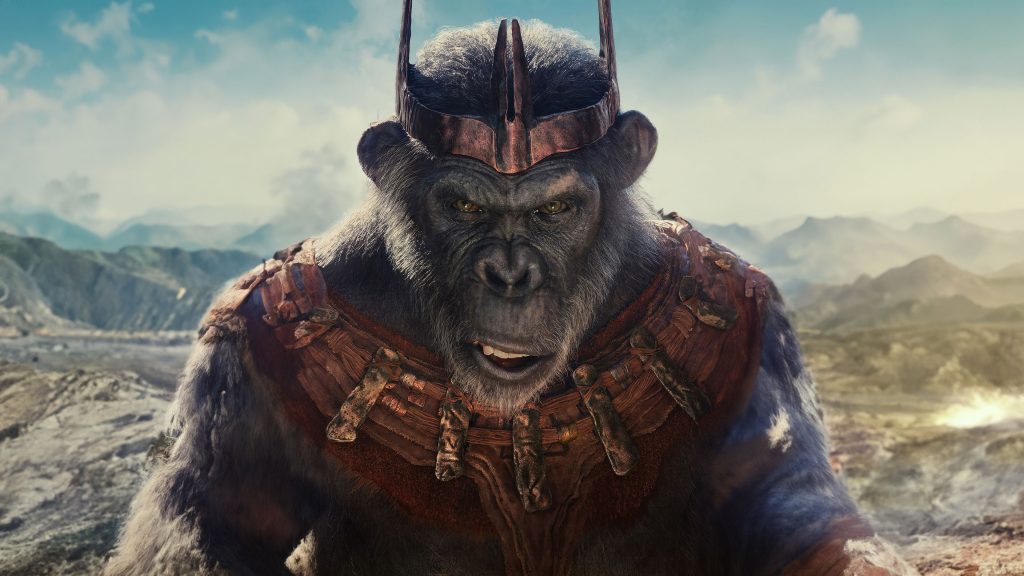It’s hard to believe that seven years have passed since War for the Planet of the Apes hit movie theaters and wrapped up the modern Apes trilogy, one that has come to define the franchise as it’s recognized now. What Matt Reeves managed to do with the latter two films in that series was, and still remains, unmatched. We just don’t get blockbuster movies, let alone sequels, with that much tact and overwhelming intensity anymore. War very well could’ve been the end, and nobody would’ve complained.
Yet, even in Caesar’s final moments and into the rolling credits, the potential for more stories lingered like a heavy fog; a fog that had persisted over a patient fan base for nearly a decade now until Wes Ball came through and dispersed it. Kingdom of the Planet of the Apes is likely going to surprise you in one way or another. This isn’t a Matt Reeves film, nor is it anything like the first film in the trilogy, Rise of the Planet of the Apes, either. Ball understood that this had to be different, and to his credit, it certainly is. Not so different that it feels out of place, but the chasmic shift in vision and tone set this one apart from the get-go. Kingdom is a world anew.

Ball also knew that getting rid of Caesar entirely would be a mistake, and so his spirit is still felt heavily over this continuation, despite it taking place “many generations” after the end of War. In the time since then, humans and apes have essentially traded places; humans, driven into the dirt by the same virus that exalted the primates, don’t speak. In their place are now apes, standing atop the food chain as rulers of a much greener, less controlled planet.
Caesar’s name still echoes on either side of the film’s conflict, which is slowly revealed through a process of discovery in multiple parts. Jumping back into this universe after the last film, considering the new circumstances, feels like encountering new horizons. The way that Ball allows the audience to explore the new world with the characters is wonderful storytelling; we discover places, threats, and things as our protagonists do, and it makes for a deeply immersive experience.

Ball also uses this sense of the unknown to his advantage with the visuals, allowing the camera to build throughout scenes into an eventual explosion of awe-inducing scale on multiple occasions. His reintroduction of planet earth feels alien in the utmost exciting way. Really, if you take one thing away from this film by the time the credits roll, let it be that Wes Ball is the man for the job. If sequels are to be expected from here on out (and this movie does nothing to disavow that) there’s absolutely no reason that he shouldn’t retain the reins. This is a striking franchise debut for him.
This is one of the greatest, most consistent accomplishments in visual effects history.
Though it certainly helps that the film’s special effects are cutting edge. It’s beating a dead horse (or ape, if you will) at this point, but the Apes franchise has long deserved an award in special effects, and not only is Kingdom no different, but it may make the best case out of any of them yet. Beyond Ball’s grandiose scene work, the film just looks magnificent. The sheer level of detail is astonishing, especially in close-up interactions where individual hairs move to the ever-changing will of the wind, and facial features twitch and jab naturally, undisturbed by the minds of their hosts.

Of course, the film is almost entirely CGI, and it’s always completely convincing. This is one of the greatest, most consistent accomplishments in visual effects history, and one look at the $160 million dollar budget tells you that it’s about more than the money; there are plenty more expensive films that look a whole lot worse. The folks behind Kingdom, like the Apes movies before it, just know how to handle this stuff. More kudos to the Kingdom.
Where the film finds the most trouble is on the narrative end. There isn’t anything about this story that screams necessary, even if it is welcome. All the beats make plenty of sense, and the film paces them throughout with a plain intentionality that services the open-ended theming quite well. In other words, the puzzle pieces together just as intended… but the final image is a tad underwhelming. Sure, it’s unimaginably difficult to follow what War and Dawn did, and to the film’s credit, the new characters are more than moving enough (credit to the superb cast here, too) to warrant further exploration, but the feeling that something is missing just can’t be shaken. Again, perhaps a sequel will pick up where this one leaves off and run where it walks, but even then, what will that mean for Kingdom? Not much, in terms of retroactively fixing the issues that this story suffers by being a little closer to the shallow end than is the norm for these movies.

That far from stifles the film as a whole though, and taken in full, Kingdom of the Planet of the Apes is exactly what it needed to be. This is a confidently crafted franchise revival that is both properly reverent and pushing forwards. It may not stack up to the previous two Apes films, but Kingdom is a worthy entry in what has become maybe the most reliable series of films still being developed. It’s a great summer watch at the cinema, and one that should stand the test of time and find a spot on your shelf a few years down the line.

Kingdom of the Planet of the Apes is now playing in theaters worldwide.
FOLLOW US ON SOCIAL MEDIA
You may also like
-
‘She Rides Shotgun’ Review: Fierce Work from Taron Egerton and a Breakout Turn from Ana Sophia Heger
-
Margot Robbie and Colin Farrell Step Into the Unknown in ‘A Big Bold Beautiful Journey’
-
‘Together’ Review: A Queasy, Clever Twist on Love and Body Horror
-
‘Weapons’ Review: Unique, Mysterious, and Thrilling, This Is the Horror Film of the Year!
-
‘The Naked Gun’ Review: Liam Neeson’s Deadpan Is Perfect Ammo for This Outrageous Comedy

